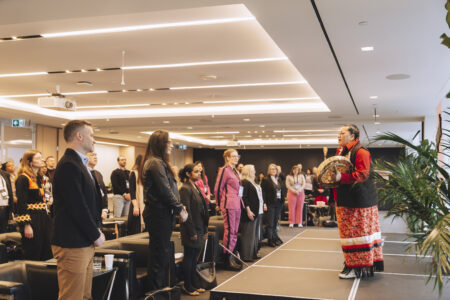Queer and Trans Women’s Leadership
Gender equality has been a topic addressed by women for centuries, and many organized movements have promoted discussions to advance equity and inclusion of women in decision-making levels. This year, the UN Women’s campaign ’Invest in Women: Accelerate Progress’ focuses on leadership, equality and opportunities for women. Pride at Work Canada is committed to creating and promoting workplaces that celebrate all employees regardless of gender expression, gender identity, and sexual orientation. Our programming and resources are designed to elevate gender equity and address intersectional issues.
Queer and trans women leaders are trailblazing in a world filled with sexism, homophobia, and transmisogyny. At Pride at Work Canada, we wanted to know more about their experiences in leadership from their challenges to successes. Our most recent study and report, Lead with Pride: Best Practices for Advancing 2SLGBTQIA+ Leadership, looked at the journeys to leadership for 2SLGBTQIA+ communities.

Carolyne De Bellefeuille, Katia Aubin (Board Director), Marika Roberts,
and Martine Roy (former Board Director) at Fierté des neiges / Winter Pride in Montreal (2024).
Lead with Pride features an analysis of the career pathways and experiences of queer and trans leaders, as well as the workplace practices of private, public, and non-profit sector employers, to establish an understanding of the barriers, supports, and opportunities for queer and trans professionals to reach leadership positions in Canada. The study delves into those career pathways and shares the voices of queer and trans women while they face challenges and discrimination.
Many of our findings are related to a lack of leadership in recognizing the talent in their teams and the systemic barriers impacting career advancement and inclusive benefits. Significant differences exist between what practices were identified as effective by leaders and what practices are actually used by employers to advance 2SLGBTQIA+ leadership. “I have faced more clear barriers as a woman in this industry than being bisexual … [though] I am experiencing less microaggressions as I progress in my career … I have adopted a more masculine style to get my voice heard,” disclosed a white bisexual woman.
It is vital to review and update upper-level recruitment practices and intentionally develop more diverse leadership pipelines at the same time as to create formal recognition and shift accountability for this work toward manager, senior and executive-level leaders. On the other hand, even though they experienced marginalization and discrimination, women participants felt that their identities and lived experiences helped them develop strong leadership skills – such as empathy, self-awareness, adaptability, inclusiveness, resourcefulness, and charisma – and leadership styles centered on authenticity, relationship building, diversity, and trust.
“I [would have] liked a mentor to show me how to be a transgender leader with a disability. [It] could have helped in my career development, having somebody in a senior [role], somebody queer, somebody with a disability to help me navigate those spaces and challenges,” pointed out a Latin American trans woman with a disability and an immigrant background. It is why supporting the development and advancement of 2SLGBTQIA+ employees as leaders through mentorship, sponsorship and leadership pipeline development is a very welcomed solution to ensure more opportunities for everyone, including queer and trans women.

Kim Wheatley opening SPARK with a good heart in Toronto (2023).
Collaborative initiatives
In Canada, we have also witnessed many advancements and policies to increase the number of women in leadership roles and boards and ensure gender equality. One of them was launched by the Government of Canada in 2020: the 50 – 30 Challenge. Pride at Work Canada was one of the many organizations that advised and collaborated with the creation of this initiative and is one of the signatories alongside various diversity organizations, institutions and networks.
This initiative is addressed to Canadian companies, not-for-profit organizations and post-secondary institutions to commit to achieving gender parity (50%) and significant representation (30%) of other under-represented groups—including racialized persons, Indigenous people, people living with disabilities, and members of the 2SLGBTQIA+ community—on corporate boards and in senior management positions.
The 50 – 30 Challenge and Pride at Work Canada can help organizations advance their goals through effective diversity and inclusion strategies. “I advise leaders to get away from the mentality of ’I can look on LinkedIn, find an Indigenous VP and bring them over here.’ They are not there, but we have them internally. We have people with these identities who are capable of moving to those levels. We just have to invest in them, nurture them and bring them up,” said an East Asian lesbian woman with an immigrant background (Lead with Pride).
Resources and Support
- Lead with Pride: Best Practices for Advancing 2SLGBTQIA+ Leadership (2023 – EN & FR)
- Transitioning Employers: A survey of policies and practices for trans inclusive workplaces (2020 – EN & FR)
- SPARK (April 17, 2024)
- Rendez-Vous: 2SLGBTQIA+ Women x Non-Binary Digital Connect
- Matrices: Trans, Non-Binary & Agender Digital Connect
- Reports, Guides & Toolkits
- Become a Proud Partner
- Accelerating Systemic Change Toolkit: Gender Equity Solutions for the Workplace – UN Global Compact Network Canada (2024 – EN & FR)
